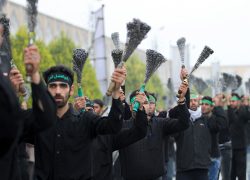His heart beat for his life as well as for Isfahan’s. You must truly love your city to become so upset when any damage is done to her. Abbas Beheshtian was such a person.
He wanted the entire city to remain as historically beautiful and tasteful as it was in his fathers’ age. He was right to wish so! Now that our surroundings are empty of four-iwan houses and colourful orsi windows, we are reminded of our loss.
In the days that traffic from both sides of the city crossed over the historical bridges, he was the only one who boldly and single-handedly endured all the hardships of objecting to the passing of traffic over the bridges. He corresponded; he arranged meetings; and he was concerned.
It escalated to the point that when a military parade was scheduled to cross the Si-o-Se Pol with tanks, heavy military machinery, and armoured cars, as his constant legal attempts had had no results, he lay down at the entrance of the bridge and said “to pass this bridge, you must pass over my dead body!”
This is how he defended the fragile and historical body of Si-o-Se Pol, so that we may still walk on the bridge with our children and tell them “Count the bridge’s arches!”
Abbas Beheshtian was not an employee or agent of the Institute of Cultural Heritage, or responsible for the historical buildings of the city so as to be concerned only because of his employment responsibilities. He could not bear any cruelty to the city.
When the news of the bombing of the Jameh Mosque spread around the city, he ran towards the mosque in tears, when a nail sticking out of a wall hit him in the eye. His eyes were never healed again to see the wounds of his city.
Abbas Beheshtian still saw with his heart’s eye and was filled with sorrow. He found historical houses, “kaboutar-khaneh” and “assar-khaneh” buildings and documented them.
He adorned the streets of the city with the names of men of literature and learning, so that their names would become immortalised. Wherever there was an ailment in need of attention, he would write letters and find solutions.
In the end, he passed away at 61, in 1366, and was buried at the Mirfendereski Tekye, at the Isfahan’s Takht-e Foulad Cemetery.
His will was that this poem of Hafez be inscribed on his gravestone and sung in the Iraqi style:
Although a hundred rivers flow from my eyes/ I remember Zendeh Rud and the Karan Garden.
Abbas Beheshtian Writer and Isfahanologist, member of the national committee of the preservation of national heritage
Date of Birth 1305 Solar, in Isfahan’s Dardasht neighbourhood
Grave Mirfenderesky Tekye







